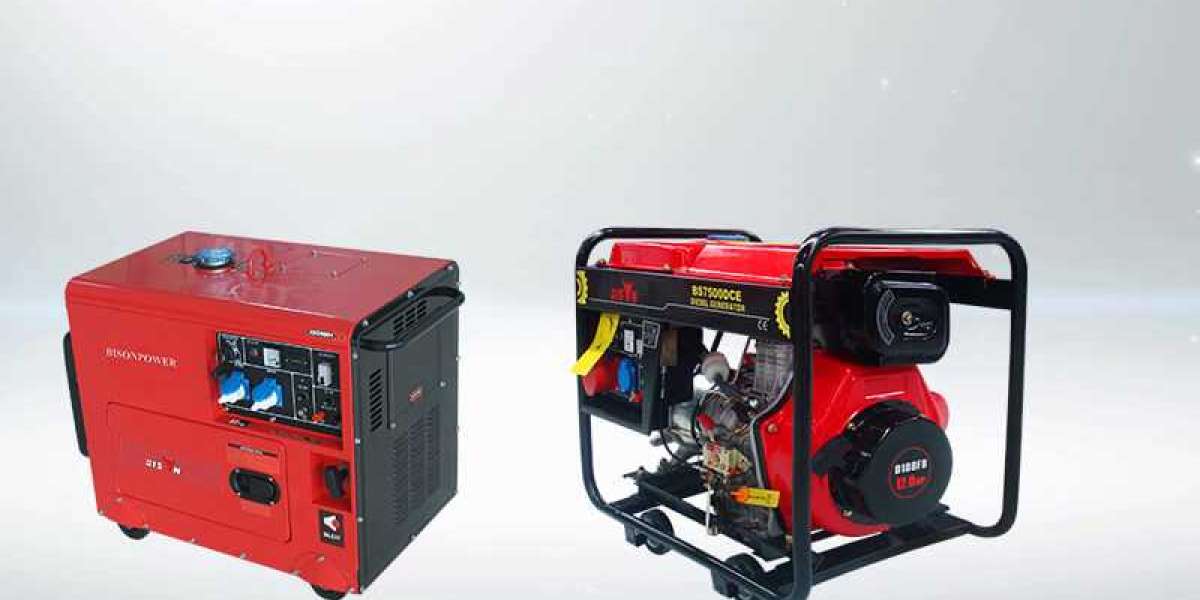Everything You Need to Know About Diesel Generators
Diesel generators are essential tools in various industries, offering a reliable and cost-effective source of power, especially in areas where electricity is scarce or unavailable. Whether you're running a large factory, a construction site, or simply need backup power for your home, understanding how diesel generators work and their benefits can help you make informed decisions. In this blog post, we’ll explore the features, advantages, and applications of diesel generators.
What is a Diesel Generator?
A diesel generator is a combination of a diesel engine and an electrical generator used to produce electricity. Diesel engines are known for their efficiency, durability, and long-lasting performance, making them an ideal choice for providing power in a variety of settings. Diesel generators come in various sizes, from small portable units to large, industrial-scale systems.
Key Features of Diesel Generators
Diesel generators are packed with features that make them reliable and efficient power sources. Here are some of the main features you can expect:
1. Fuel Efficiency
One of the most significant advantages of a diesel generator is its fuel efficiency. Diesel engines consume less fuel compared to gasoline-powered engines, making them more economical for extended use. This can be especially important for large-scale operations where power demand is constant.
2. Long-Lasting Durability
Diesel generators are built to last. The rugged design of the diesel engine ensures that it can handle heavy-duty operations over a long period. They typically have a longer lifespan than gasoline engines, which means less frequent maintenance and replacements.
3. High Power Output
Diesel generators are capable of producing a large amount of power, making them suitable for applications that require a continuous power supply. From powering industrial machinery to providing electricity for large buildings, diesel generators can handle significant loads.
4. Versatility
Diesel generators come in a range of sizes and capacities, making them versatile enough for both residential and industrial use. Whether you need a small backup generator for your home or a large unit for your business, diesel generators can meet various power requirements.
5. Easier Maintenance
Compared to other types of generators, diesel engines require relatively low maintenance. Diesel engines are less prone to wear and tear due to their simpler design, and they do not have spark plugs or carburetors, which often need to be replaced in gasoline-powered engines.
Benefits of Using Diesel Generators
1. Cost-Effective Power Supply
Although the initial cost of a diesel generator may be higher than that of other types of generators, their fuel efficiency and long lifespan make them a cost-effective option in the long run. For businesses and industries that require uninterrupted power, investing in a diesel generator can lead to significant savings.
2. Reliable Performance
Diesel generators are known for their reliable performance, especially in emergencies. They are often used as backup power solutions during blackouts or natural disasters. With a diesel generator, you can ensure that your operations continue without disruption, no matter what.
3. Environmentally Friendly Options
Modern diesel generators are designed with advanced technologies that reduce emissions and make them more environmentally friendly. These generators are also more fuel-efficient, which helps minimize the carbon footprint of your operations.
4. Wide Range of Applications
From powering homes and small businesses to supporting large industrial projects, diesel generators serve a wide variety of needs. They're commonly used in sectors like construction, mining, healthcare, agriculture, and telecommunications.
How Diesel Generators Work
Diesel generators operate by using a diesel engine to drive an alternator, which converts mechanical energy into electrical energy. Here's a simple breakdown of how they work:
- Fuel Injection: Diesel fuel is injected into the engine’s combustion chamber.
- Compression and Ignition: The engine compresses the fuel, raising its temperature. This causes the fuel to ignite and power the engine.
- Mechanical Energy Conversion: The engine’s mechanical energy is transferred to the alternator, which generates electricity.
- Power Output: The electrical energy is sent out from the generator to power the intended devices or systems.
Applications of Diesel Generators
Diesel generators are used in a variety of applications, ranging from residential to industrial purposes:
1. Residential Use
Many homeowners rely on diesel generators as backup power during power outages. In rural areas or places with unreliable electricity grids, diesel generators provide a stable source of power.
2. Commercial and Industrial Use
Businesses and factories use diesel generators to power equipment and machinery during outages or when there's a high demand for power. For example, hospitals need diesel generators to maintain critical operations in case of power failure.
3. Construction Sites
Construction projects often rely on diesel generators to power machinery, tools, and equipment in remote locations where access to the electrical grid is limited or non-existent.
4. Agricultural Use
Diesel generators can be used to power irrigation systems, cold storage units, and other essential equipment on farms, particularly in off-grid locations.
Choosing the Right Diesel Generator
When selecting a diesel generator, there are a few factors to consider:
- Power Capacity: Determine how much power you need. Diesel generators come in different sizes, and it’s important to choose one that matches your power requirements.
- Portability: If you need a mobile power source, opt for a portable generator that can easily be transported to different locations.
- Fuel Efficiency: Look for generators that offer maximum fuel efficiency, which can save you money in the long term.
- Maintenance and Support: Choose a reputable brand that offers good customer support and easy access to maintenance services.
Conclusion
In summary, diesel generators are a reliable and efficient source of power for various applications. Whether you're looking for a backup power solution for your home or a continuous power source for your business, a diesel generator can meet your needs. With features like fuel efficiency, durability, and versatility, diesel generators offer long-term benefits that make them a popular choice in the market.
If you're considering investing in a diesel generator, make sure to do thorough research and choose the right model that best suits your requirements.






